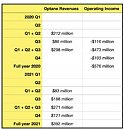TheLostSwede
News Editor
- Joined
- Nov 11, 2004
- Messages
- 18,472 (2.47/day)
- Location
- Sweden
| System Name | Overlord Mk MLI |
|---|---|
| Processor | AMD Ryzen 7 7800X3D |
| Motherboard | Gigabyte X670E Aorus Master |
| Cooling | Noctua NH-D15 SE with offsets |
| Memory | 32GB Team T-Create Expert DDR5 6000 MHz @ CL30-34-34-68 |
| Video Card(s) | Gainward GeForce RTX 4080 Phantom GS |
| Storage | 1TB Solidigm P44 Pro, 2 TB Corsair MP600 Pro, 2TB Kingston KC3000 |
| Display(s) | Acer XV272K LVbmiipruzx 4K@160Hz |
| Case | Fractal Design Torrent Compact |
| Audio Device(s) | Corsair Virtuoso SE |
| Power Supply | be quiet! Pure Power 12 M 850 W |
| Mouse | Logitech G502 Lightspeed |
| Keyboard | Corsair K70 Max |
| Software | Windows 10 Pro |
| Benchmark Scores | https://valid.x86.fr/yfsd9w |
Despite its technical advantages over NAND flash, Intel's Optane memory technology never really took off in the consumer space, largely due to its much higher costs. Based on details from Intel's SEC filings, it would appear that its corporate customers haven't been overly impressed either, as Intel filed a US$576 million loss in 2020 with regards to its Optane business.
As to if this trend continued in 2021, we're going to have to wait and see, but it looks like the losses are set to continue based on its revenue figures, according to Blocks and Files. With this in mind, it seems like Micron's exit from 3D XPoint memory isn't so hard to understand, as the technology is clearly too costly to make up for the benefits on offer, for most of its potential customer base. Transitions to higher-density 3D XPoint memory has also been slow, which might be yet another reason customers have shied away from using it, even as a caching solution in storage servers. It wouldn't surprise us if Intel moves on from Optane/3D XPoint memory in the near future, as the company seems to have shifted its focus firmly away from storage solutions.

View at TechPowerUp Main Site
As to if this trend continued in 2021, we're going to have to wait and see, but it looks like the losses are set to continue based on its revenue figures, according to Blocks and Files. With this in mind, it seems like Micron's exit from 3D XPoint memory isn't so hard to understand, as the technology is clearly too costly to make up for the benefits on offer, for most of its potential customer base. Transitions to higher-density 3D XPoint memory has also been slow, which might be yet another reason customers have shied away from using it, even as a caching solution in storage servers. It wouldn't surprise us if Intel moves on from Optane/3D XPoint memory in the near future, as the company seems to have shifted its focus firmly away from storage solutions.

View at TechPowerUp Main Site





